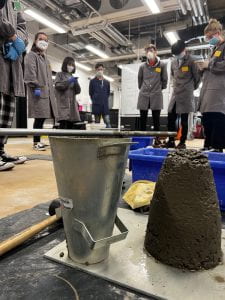If I am to describe the second semester for Civil and Structural engineering in one word, it would be “teamwork”. In contrast to the calculation-heavy semester one, semester two revolves around group projects and reports. There are fewer assignments but each assignment is worth a lot in terms of grade and almost always involves other people. On top of that, as most companies start recruiting throughout the second semester, internship hunting will also consume a lot of time. But more on that in my next blog! For now, here’s a rough overview of each course in semester two:
ENGGEN 204: Professional Skills and Communication
As you may have guessed, this course revolves around teamwork and communication in a professional environment. There are two lectures and one tutorial per week. From the first tutorial, you’ll be assigned to a group of 7 or 8 that you will work with for the rest of the semester. As this is an ENGGEN course, you’ll most likely meet and work with other engineering students from other specialisations.
There are three team projects which make up 60% of the total grade, two tests worth 30% with the remaining 10% from tutorial attendance. The three team projects include:
- Video Assignment Project where you and your group work together to produce a video that communicates an idea or concept.
- Report Project where you and your group work together to write a literature review report on a topic.
- Team Presentation where you and your group work together to research, create and give a live presentation in front of your tutorial class.
Peer review can drastically affect your grade. For, unlike last year, you can receive a grade higher (or lower) than your group’s overall mark. Hence, contributing and working well in your team is critical not only for your overall group’s grade but also for your own grade as well. Another thing to keep in mind is that you’ll only have 2 or 3 weeks to complete these projects, so breaking the project down into tasks and setting clear deadlines for each task well before the deadline will ensure you have enough time to make changes if needed when something goes wrong.
I personally find this to be my favourite course as I enjoy working with my team. But I’ve heard stories of people being a little harsh in their peer reviews. Regardless, this course will allow you to work in the same team over a prolonged period of time, a great opportunity to make new friends and learn new skills.
ENVENG 200: Fundamentals of Environmental Engineering
Similiar to ENGGEN 204, this course is divided into three main chunks or modules. Each module has its own project and ends with a test. So you’ll be glad to hear that this course does not have any exam! Yay?
In the first module you’ll learn more about global environmental issues, including climate change and environmental pollution. You’ll also learn about the three water that everyone talks about; drinking water, storm water and waste water, as well as the different pathogens in water and how to treat them.
The second module focuses on the Environmental Impact Assessment (EIA) which commonly refer to as the Assessment of Environmental Effects (AEE) in New Zealand. Pretty much a report of the potential effects (both positive and negative) of activies, how to mitigate them as well as any relevant council plans and legislations.
The last module is about the air quality and noise. You’ll learn about the different factors affecting the air and accoustic quality and the different sources of air and noise pollution as well as the appropriate corresponding actions to migitate its effects. Did you know tunnels can have 1000 times greater air pollution concentration than open spaces?
From our beautiful natural environment to the clever design of the city water fountain that masks the mechanial noise of modern civilisation, you’ll gain a greater understanding and appreciation of everything around you.
Civil 200: Introduction to Geotechnical Engineering
Soils and rocks and stuff!
You’ll learn about soil and rocks and how to identify, classify and characterise them. You’ll learn how to calculate shear strength of soil and permeability and seepage (how water flow through soil). You’ll also learn about the different lab and field techniques and experiments to gather data, test specimens and make measurements. 
In short, you’ll learn about the fundamentals of Geotechnical Engineering, i.e. soils and rocks and stuff.
Kidding aside, you’ll learn about the different behaviour of different soil in different situation. Soil, like everything in nature, is highly variable. There is a high level of uncertainty so making judgment is an essential aspect of geotechnical engineering. You’ll get to attend three lab sessions where you can see practical demonstrations of the different experiments and how soil behave in real life. You’ll even get to touch soil and clay a few times! How exciting!
I find labs to be extremely useful in helping me understand the content. They are undoubtedly my favourite part of the course. After taking this course, I’ve become more aware of the importance of geotechnical engineering. Afterall, if a building is only as strong as its foundation, the soil beneath is the foundation of that foundation!
STRCTENG 201: Civil Engineering Materials and Design
In the first three weeks, you’ll learn more about the three main types of building materials; concrete, steel and timber. During this period, a concrete lab takes place where you get to mix and make your own concrete. There’s also a test in either the third or fourth week.
In the following week, you’ll learn about road construction materials such as bitumen binders and asphalt mixers as well as the different layers of road. Another lab also takes place where you get to see the different material tests in real life.
Then comes the more challenging part; structural. The consensus seems to be that this is the most difficult part of the second semester. For the next eight weeks of the semester you’ll learn about the following:
- Behaviour of Compression Members – how beams behave under compressive loads.
- Qualitative Analysis of structures – drawings of how structures deflect under loading and how to draw bending moment diagram from the different deflected shapes.
- Moment Area Method – a way to calculate bending moment and deflection.
- Slope Deflection Method – a way to calculate bending moment and deflection.
- Virtual Work Method – a way to calculate bending moment and deflection.
- Unit Load Method – a way to calculate bending moment and deflection.
- Flexibility Method – a way to calculate bending moment and deflection.
Similar to the structural course in the first semester, there is not a lot of assignments to force you to study. Making the effort to study on your own without the need of a looming deadline will be key to doing well in this course!
At the time of this writing, I am currently revising for my last exam, the Civil 200 exam. I find the content of this semester to be more interesting than the first. I’ve leant a lot of things that made me go “Ahh that makes sense”. Besides that not much else to say about the content of this semester.
One thing I will say though is please prioritise your mental well beings. It is very easy to get caught up in uni and in life. The constant assignments, looming deadlines, grades lower than you expected, rejection from companies you apply to. Maybe it’s the pressure from your perfectionist self for not getting that extra 5% in the test. Maybe it’s the comparison of others who seemingly “achieve” more than you by landing that internship. Whatever it is, your grades and “achievements” don’t define you, and it definitely won’t be the end-all-be-all for your carreer.
Anyways, here’s a picture of a duck to make your day!

Bye!!!!

Love the content! This perfectly describes our experience 😀
Amazing blog Sor! Provides great insight on what we Civil students did during semester 2!